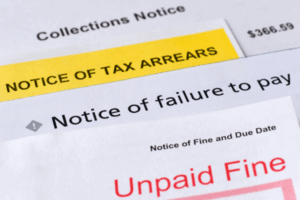
Robodebt class action — Australia’s biggest settlement
Last updated on October 14th, 2025
Robodebt is one of Australia’s biggest government scandals, dragging on for almost a decade, triggering several investigations, a royal commission, two class actions and destroying countless lives in the process. With the Labor Government agreeing to settle the latest Robodebt class action, will victims of the disastrous welfare recovery scheme finally be able to move on?
Announcing the government would pay another $475 million to victims, on top of $112 million already distributed to class action members in 2022, Attorney General Michelle Rowland said it was the just and fair thing to do.
“The royal commission described Robodebt as a ‘crude and cruel mechanism, neither fair nor legal’,” Ms Rowland said. “It found that ‘people were traumatised on the off chance they might owe money and that Robodebt was a costly failure of public administration, in both human and economic terms’.”
The Robodebt class action appeal was launched in September 2024 in the wake of the royal commission’s findings that senior public servants who ran the scheme knew it was unlawful from the start.
While the latest victory brings more vindication, there is a way to go for victims yet. The Federal Court still must approve the settlement, and then it will take time to determine how that money will be distributed among class action members.

What was Robodebt?
The scheme was developed by the then Coalition Government as part of a 2015-2016 budget measure entitled “Strengthening the Integrity of Welfare Payments”. The government forecast the scheme would save up to $5 billion from 2014 to 2021.
The Income Compliance Program, better known as Robodebt, ran between 2015 and 2019. It used an automated process to compare financial income from Centrelink against annual data from the Australian Taxation Office (ATO), then issued debt notices based on yearly income averaging rather than actual fortnightly earnings.
Community and welfare groups campaigned against the controversial scheme from the start, with Robodebt scrutinised by the Commonwealth Ombudsman, the Australian National Audit Office and parliamentary committees over the ensuing years.
In 2019, a landmark challenge brought by Victorian Legal Aid found that Robodebt was not lawful because it relied on income averaging.
An individual’s eligibility for welfare payments is based on the income they receive in the same fortnight, not a fortnightly income averaged over a longer period, making the scheme illegal.
Gordon Legal brought a class action on behalf of all victims, with the then Shadow Minister for government services Bill Shorten arguing it was time to “test the legal foundations of Robodebt, because my own research in the last couple of months has led me to believe it is almost certainly illegal”.
How did Robodebt affect Australians?
The effect of Robodebt was widespread and devastating. More than 400,000 Australians were issued with debt notices based on the illegal averaging.
The burden was on them to provide records of wages or bank transactions to prove they didn’t owe the government money, a move that was also later found to be unlawful.
Many took out loans they could ill-afford to pay back debts they should never have been charged in the first place. Others were hounded by debt collectors, compounding their distress and pushing them to the brink.
Two mothers gave evidence to the 2022 royal commission of Robodebt’s role in the suicides of their sons, with the commission noting in its the final report that it was confident these were not the only tragedies of this kind.
“What is certain is that the scheme was responsible for heartbreak and harm to family members of those who took their own lives because of the despair the scheme caused them,” the report said.

What was the first Robodebt class action?
The Federal Court approved a settlement worth $1.8 billion between the commonwealth and Robodebt victims in June 2021.
It came in the wake of the Morrison Government agreeing, as the class action trial was due to start in November 2020, to repay at least 381,000 people $751 million and wipe debts worth $1.76 billion raised using the automated averaging. The settlement also included $112 million in interest to be shared among the victims.
“The proceeding has exposed a shameful chapter in the administration of the commonwealth social security system and a massive failure of public administration,” Justice Bernard Murphy said.
The judge criticised the government’s massive failure but said he did not think there was evidence that proved the government knew it was unlawful when established.
However, the royal commission’s final report revealed evidence that was not handed over during the first class action, including that senior government officials knew Robodebt was unlawful.
Gordon Legal appealed the class action settlement, making new claims of misfeasance in public office against officials who continued to pursue Australians despite knowing the scheme was illegal.

What does the latest settlement mean?
The decision to award a further $475 million to Robodebt victims, taking the total compensation to $548.5 millmisfion, is further recognition of the pain and suffering they have endured through the illegal scheme.
There is provision for up to $60 million to be set aside to administer the class action settlement and up to $13.5 million to cover applicants’ legal costs.
But class action members will have to wait for Federal Court approval and, if successful, the subsequent dispersal of the settlement.
The Federal Court took seven months to approve the first settlement and it was another three months before money was distributed to victims.
With about 450,000 affected, an average share could amount to just $1000, though Gordon Legal has indicated group members will have the option of individualised assessments.

There is also continued disquiet about what award-winning journalist Rick Morton described as the “social engineering of shame”. His book about the scheme, Mean Streak, recently won the Prime Minister’s Literary Award for non-fiction. An SBS documentary, The People vs Robodebt, also examines the scandal in detail, asking how Robodebt could “ever get off the ground, let alone run for years”.
Many, including the Australia Council of Social Service chief executive Cassandra Goldie, question how those responsible have escaped punishment.
“Ten years on from when Robodebt commenced, no one responsible for its design, implementation and continuation has been publicly held accountable in a way that delivers justice for its victims and their families," she said in a statement.
Why this class action matters
Robodebt victims have been fighting for compensation for years. While the successful outcome of the first class action was welcomed, the revelations at the subsequent royal commission provoked more distress and anger.
Gordon Legal argued that critical evidence was not made available to the applicants during the first Robodebt class action and they deserved to have the new information heard in court. Peter Gordon, the law firm’s founder, said the Federal Court’s decision to increase compensation by almost $500 million was "a day of vindication and validation”.
While class actions are expensive and time consuming, they are also often the only way to hold governments and large corporations to account. Without this legal avenue, Robodebt victims may never have seen some semblance of justice.
“For some, there are wounds that will never heal and we can never do justice to those people, and the system can't,” Mr Gordon said. “But what we do hope and feel is that people today feel that their voices have been heard.”






